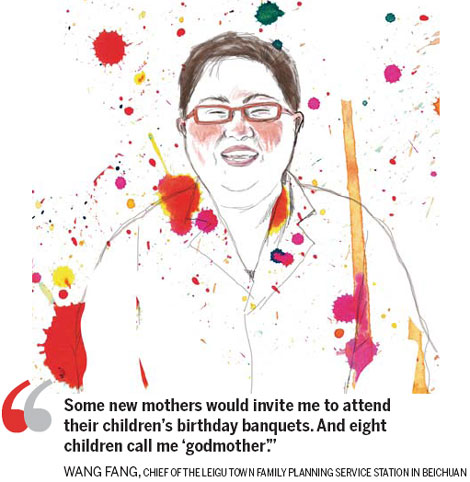Rebuilding houses, families and hope
Updated: 2012-03-22 09:26
By Liu Xiangrui and Huang Zhiling (China Daily)
|
|||||||||||

She brings the rebirth of hope
Wang Fang thought only one thing when the 8.0-magnitude earthquake jolted her office building in Sichuan province's Leigu town in Beichuan county: "I'll never return to this terrible place."
The 38-year-old chief of the Leigu Town Family Planning Service Station in Beichuan - the epicenter of the May 12, 2008 Wenchuan earthquake that left 90,000 dead or missing - not only returned but also helped 100 middle-aged mothers, who lost their children in the disaster, give birth.
About 350 children from more than 300 families in Leigu died in the disaster. Leigu's population is nearly 18,000.
"Most of the mothers were 36 and 37 years old. The oldest was 44," Wang says.
Soon after the quake, Wang, who was the station's only staff member, braved the mountain path to visit the bereaved mothers to find out how many wanted to have babies.
In January 2009, she finished creating a file on each of more than 100 families who did.
But the traumatized mothers' anxieties complicated conception.
Wang brought rice and cooking oil when she visited to develop a rapport with them. She and the women started addressing each other as "sister", she says.
Sichuan started a reproductive program to help bereaved mothers give birth in October 2008.
Since then, 3,194 babies have been born, the provincial information office says.
But not all women are so lucky. Four of Wang's "sisters" became pregnant several times but miscarried.
"I was heartbroken," Wang says. "The saddest was when one woman lost her baby a month before it would have entered the safer stage of pregnancy."
Seven of the older women who faced conception complications tried in vitro fertilization twice but failed.
One "sister" could only meet her husband once a month because he worked in the electric power sector. Wang visited the husband's leader to ask for more opportunities for them to meet.
"But my proposal was turned down," Wang says.
Wang shared a prefabricated house with a woman colleague for two years after the quake.
Because of her busy schedule, she seldom saw her husband, who works in another town.
The lack of communication caused their divorce, she says.
Despite her personal sufferings, Wang is overjoyed whenever "sisters" with new babies visit her in the station.
"There is always candy, cakes and toys for the babies in my drawer," Wang says.
"Some new mothers would invite me to attend their children's birthday banquets. And eight children call me 'godmother'."
Wang is extremely happy when an older woman manages to give birth.
Zhao Tairong lost her 13-year-old son, who was in junior high. Her inability to become pregnant put a strain on her relationship with her husband. They planned to divorce.
Wang arranged for Zhao to undergo a physical checkup. The doctors discovered the 43-year-old suffered from a pelvic inflammatory disease. After taking medicine, Zhao gave birth to a boy in January 2010.
"The boy is active," Wang says. "He loves to play."
Today's Top News
President Xi confident in recovery from quake
H7N9 update: 104 cases, 21 deaths
Telecom workers restore links
Coal mine blast kills 18 in Jilin
Intl scholarship puts China on the map
More bird flu patients discharged
Gold loses sheen, but still a safe bet
US 'turns blind eye to human rights'
Hot Topics
Lunar probe , China growth forecasts, Emission rules get tougher, China seen through 'colored lens', International board,
Editor's Picks

|

|

|

|

|

|





